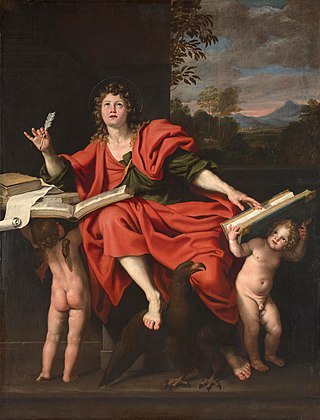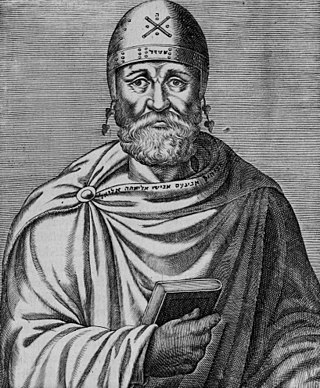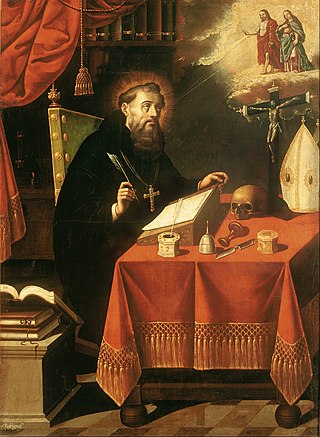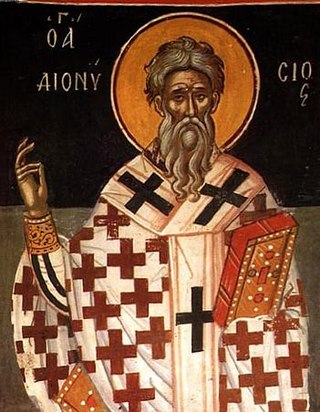Related Research Articles

The Book of Revelation, also erroneously called the Book of Revelations, is the final book of the New Testament. Written in Koine Greek, its title is derived from the first word of the text: apokalypsis, meaning 'unveiling' or 'revelation'. The Book of Revelation is the only apocalyptic book in the New Testament canon. It occupies a central place in Christian eschatology.

Origen of Alexandria, also known as Origen Adamantius, was an early Christian scholar, ascetic, and theologian who was born and spent the first half of his career in Alexandria. He was a prolific writer who wrote roughly 2,000 treatises in multiple branches of theology, including textual criticism, biblical exegesis and hermeneutics, homiletics, and spirituality. He was one of the most influential and controversial figures in early Christian theology, apologetics, and asceticism. He has been described as "the greatest genius the early church ever produced".

The Patriarch of Alexandria is the archbishop of Alexandria, Egypt. Historically, this office has included the designation "pope".

Philo of Alexandria, also called Philo Judaeus, was a Hellenistic Jewish philosopher who lived in Alexandria, in the Roman province of Egypt.

The Epistle of Barnabas is a Greek epistle written between AD 70 and 132. The complete text is preserved in the 4th-century Codex Sinaiticus, where it appears immediately after the New Testament and before the Shepherd of Hermas. For several centuries it was one of the "antilegomena" ("disputed") writings that some Christians looked on as sacred scripture, while others excluded them. Eusebius of Caesarea classified it as such. It is mentioned in a perhaps third-century list in the sixth-century Codex Claromontanus and in the later Stichometry of Nicephorus appended to the ninth-century Chronography of Nikephoros I of Constantinople. Some early Fathers of the Church ascribed it to the Barnabas who is mentioned in the Acts of the Apostles, but it is now generally attributed to an otherwise unknown early Christian teacher, although some scholars do defend the traditional attribution. It is distinct from the Gospel of Barnabas.

Old Earth creationism (OEC) is an umbrella of theological views encompassing certain varieties of creationism which may or can include day-age creationism, gap creationism, progressive creationism, and sometimes theistic evolutionism.
Premillennialism, in Christian eschatology, is the belief that Jesus will physically return to the Earth before the Millennium, heralding a literal thousand-year golden age of peace. Premillennialism is based upon a literal interpretation of Revelation 20:1–6 in the New Testament, which describes Jesus's reign in a period of a thousand years.
Cerinthus was an early Gnostic, who was prominent as a heresiarch in the view of the early Church Fathers. Contrary to the Church Fathers, he used the Gospel of Cerinthus, and denied that the Supreme God made the physical world. In Cerinthus' interpretation, the Christ descended upon Jesus at baptism and guided him in ministry and the performing of miracles, but left him at the crucifixion. Similarly to the Ebionites, he maintained that Jesus was not born of a virgin, but was a mere man, the biological son of Mary and Joseph.
Basilides was an early Christian Gnostic religious teacher in Alexandria, Egypt who taught from 117 to 138 AD, and claimed to have inherited his teachings from the apostle Saint Matthias. He was a pupil of either the Simonian teacher Menander, or a supposed disciple of Peter named Glaucias. The Acts of the Disputation with Manes state that for a time he taught among the Persians. According to Agapius of Hierapolis he appeared in the 15th year of Trajan reign. He is believed to have written over two dozen books of commentary on the Christian Gospel entitled Exegetica, making him one of the earliest Gospel commentators.

The authorship of the Johannine works has been debated by biblical scholars since at least the 2nd century AD. The debate focuses mainly on the identity of the author(s), as well as the date and location of authorship of these writings.

Amillennialism or amillenarism is a chillegoristic eschatological position in Christianity which holds that there will be no millennial reign of the righteous on Earth. This view contrasts with both postmillennial and, especially, with premillennial interpretations of Revelation 20 and various other prophetic and eschatological passages of the Bible.

Pope Heraclas was the 13th Pope and Patriarch of Alexandria, reigning 232–248.

Dionysius the Great was the 14th Pope and Patriarch of Alexandria from 28 December 248 until his death on 22 March 264. Most information known about him comes from his large surviving correspondence. Only one original letter survives to this day; the remaining letters are excerpted in the works of Eusebius.

Lucifer of Cagliari was a bishop of Cagliari in Sardinia known for his passionate opposition to Arianism. He is venerated as a Saint in Sardinia, though his status remains controversial.
Biblical literalism or biblicism is a term used differently by different authors concerning biblical interpretation. It can equate to the dictionary definition of literalism: "adherence to the exact letter or the literal sense", where literal means "in accordance with, involving, or being the primary or strict meaning of the word or words; not figurative or metaphorical".

Allegorical interpretations of Genesis are readings of the biblical Book of Genesis that treat elements of the narrative as symbols or types, rather than viewing them literally as recording historical events. Either way, Judaism and most sects of Christianity treat Genesis as canonical scripture, and believers generally regard it as having spiritual significance.

Against Celsus, preserved entirely in Greek, is a major apologetics work by the Church Father Origen of Alexandria, written in around 248 AD, countering the writings of Celsus, a pagan philosopher and controversialist who had written a scathing attack on Christianity in his treatise The TrueWord. Among a variety of other charges, Celsus had denounced many Christian doctrines as irrational and criticized Christians themselves as uneducated, deluded, unpatriotic, close-minded towards reason, and too accepting of sinners. He had accused Jesus of performing his miracles using black magic rather than actual divine powers and of plagiarizing his teachings from Plato. Celsus had warned that Christianity itself was drawing people away from traditional religion and claimed that its growth would lead to a collapse of traditional, conservative values.

Origenism refers to a set of beliefs attributed to the Christian theologian Origen. The main principles of Origenism include allegorical interpretation of scripture, pre-existence, and subordinationism. Origen's thought was influenced by Philo the Jew, Platonism and Clement of Alexandria.
The Arian controversy was a series of Christian disputes about the nature of Christ that began with a dispute between Arius and Athanasius of Alexandria, two Christian theologians from Alexandria, Egypt. The most important of these controversies concerned the relationship between the substance of God the Father and the substance of His Son.
Articles related to Christianity include:
References
- ↑ Eusebius' Ecclesiastical History, Book VII, Chapter XXIV 1.
- ↑ Le Quien, Michel (1740). "V. Provincia Arcadia, quae Heptanomus". Oriens christianus (in Latin). Vol. Tomus Secundus. Paris: Typographia Regia. p. 581.
- ↑ Thomas A. Robinson; Thomas Arthur Robinson (1 December 2016). Who Were the First Christians?: Dismantling the Urban Thesis. Oxford University Press. p. 161. ISBN 978-0-19-062054-7.
- ↑ Nepos of Arsinoë, New Catholic Encyclopedia, (2003).
- ↑ Eusebius' Ecclesiastical History, Book VII, Chapter XXIV 1-2.
- ↑ Eusebius' Ecclesiastical History, Book VII, Chapter XXIV 3.
- ↑ Eusebius' Ecclesiastical History, Book VII, Chapter XXV.
- ↑ Eusebius'Chapter XXIV 1
- ↑
 Bonwetsch, N. (1910). "Nepos". In Jackson, Samuel Macauley (ed.). New Schaff–Herzog Encyclopedia of Religious Knowledge . Vol. 8 (third ed.). London and New York: Funk and Wagnalls. pp. 114–115.
Bonwetsch, N. (1910). "Nepos". In Jackson, Samuel Macauley (ed.). New Schaff–Herzog Encyclopedia of Religious Knowledge . Vol. 8 (third ed.). London and New York: Funk and Wagnalls. pp. 114–115.